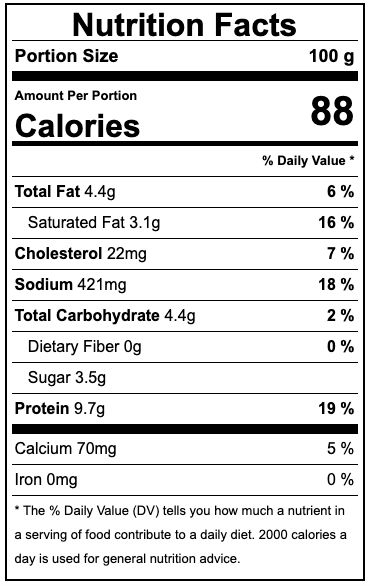Discover the revival of cottage cheese as a superfood with numerous health benefits. Explore its unique nutritional profile, learn the difference between cottage cheese and paneer, and find out how it can enhance your culinary creations. Plus, uncover the best cottage cheese recipes for a delicious and nutritious experience.
In the ever-evolving world of healthy eating, new food trends continuously emerge to tantalize our taste buds while promoting wellness. One such trend that has gained significant traction in recent years is the rediscovery of cottage cheese. Once dismissed as a bland and outdated ingredient, it has made a remarkable comeback, captivating health enthusiasts and culinary experts alike. With its numerous health benefits, versatility in recipes, and unique nutritional profile, cottage cheese has firmly established itself as a superfood worth exploring.
What is cottage cheese?
Cottage cheese is a soft, fresh cheese made from curds of cow’s milk. It is created by acidifying milk and separating the curds from the whey. The curds are then lightly pressed to retain moisture, resulting in a lumpy and creamy texture. This unaged cheese has a mild and slightly tangy flavour, making it an ideal canvas for various culinary creations.
Benefits of cottage cheese

High-quality protein
It is a fantastic source of high-quality protein. Protein is crucial for muscle growth, repair and maintenance, making it an essential nutrient for athletes, fitness enthusiasts and those looking to build lean muscle mass. The protein in cottage cheese contains all the essential amino acids required by the body.
Weight management
It is low in calories and carbohydrates, making it a great choice for individuals aiming to manage their weight. Its high protein content promotes satiety, helping you feel fuller for longer and reducing the likelihood of overeating. Additionally, the combination of protein and minimal carbohydrates supports stable blood sugar levels, preventing spikes and crashes that can lead to cravings.
Bone health
Cottage cheese is a rich source of calcium, a vital mineral for strong bones and teeth. Calcium plays a crucial role in maintaining bone density and reducing the risk of osteoporosis, a condition characterized by weakened bones and an increased susceptibility to fractures. Consuming cottage cheese regularly can contribute to achieving and maintaining optimal bone health.
Nutrient density
It offers a range of essential vitamins and minerals necessary for overall well-being. It contains significant amounts of vitamin B12, a nutrient essential for nerve function and the production of red blood cells. Additionally, it is a good source of riboflavin (vitamin B2), which supports energy metabolism, and selenium, an antioxidant that helps protect cells from oxidative stress. Cottage cheese also provides potassium, a mineral important for maintaining proper fluid balance and supporting heart health.
gut health
It contains beneficial bacteria known as probiotics. These live microorganisms support a healthy gut microbiome, which plays a crucial role in digestion, nutrient absorption, and overall immune function. Probiotics can help maintain a balanced intestinal environment and support the growth of beneficial bacteria in the gut.
Versatility in recipes
It is incredibly versatile in the kitchen, allowing for a wide range of culinary creations. It can be used as a base for dips, spreads, and sauces, added to smoothies or pancakes for a protein boost, or incorporated into both sweet and savory dishes. Its creamy texture and mild flavor make it an excellent ingredient for various recipes, providing a nutritious and delicious twist.
Incorporating this into your diet can bring about these health benefits, promoting overall well-being and supporting your fitness and nutritional goals. Remember to choose high-quality cottage cheese, preferably made from organic or grass-fed milk, for maximum nutritional value.
Cottage cheese vs. paneer: The difference
While cottage cheese and paneer share some similarities, they are not one and the same. Paneer, a popular cheese in Indian cuisine, is also made from cow’s milk but involves a slightly different process. Paneer is made by curdling milk with lemon juice or vinegar, resulting in a firmer texture compared to cottage cheese. Additionally, paneer is typically pressed to remove excess moisture, giving it a more solid consistency. While both cheeses have their unique attributes, cottage cheese’s creamy and delicate texture sets it apart, making it a versatile ingredient in a wide range of dishes.
Cottage cheese: Calories & nutritional value

It offers a host of essential vitamins and minerals, including vitamin B12, riboflavin, selenium and potassium. These nutrients play vital roles in supporting energy metabolism, cell function, and overall well-being.
Divine delights: Unveiling the best cottage cheese recipes
Cottage cheese pancakes

Ingredients:
1 cup cottage cheese
3 eggs
¼ cup all-purpose flour
2 tablespoons melted butter
¼ teaspoons salt
1 teaspoons butter, or as needed
¼ cup blueberries, or to taste (optional)
Directions:
Step 1: Achieve a drier consistency of cottage cheese by straining it in a sieve placed over a bowl, occasionally applying pressure, for approximately 1 hour.
Step 2: In a medium bowl, whisk the eggs and combine them with cottage cheese, flour, melted butter and salt. Blend the mixture until well incorporated.
Step 3: Heat butter in a frying pan over medium-high heat, and carefully drop generous spoonfuls of the batter into the sizzling butter. Enhance the pancakes by scattering blueberries onto the batter. Cook until both sides are delicately golden, which usually takes about 2 to 3 minutes per side.
Soft scrambled eggs
Frequently Asked Questions (FAQs)
Answer: For individuals who are lactose intolerant or following a dairy-free diet, there are several alternatives to traditional cottage cheese available. Lactose-free cottage cheese is a viable option, as it is specifically processed to remove lactose, making it easier to digest. Additionally, plant-based alternatives made from ingredients like tofu, nuts, or soy offer dairy-free options that mimic the texture and taste of cottage cheese. Homemade versions using ingredients like tofu or cashews can also be created at home. These lactose-free and dairy-free alternatives provide options for individuals to enjoy the creamy and versatile qualities of cottage cheese without compromising their dietary needs or preferences.
Answer: Cottage cheese is a versatile ingredient that can be easily incorporated into your daily diet. Start your day by adding a scoop of cottage cheese to your breakfast smoothies, oatmeal, or yogurt for a protein-packed boost. For a satisfying snack, enjoy cottage cheese with fresh fruit or spread it on whole-grain crackers. You can also use cottage cheese as a substitute for higher-fat ingredients in recipes, such as sour cream or mayonnaise, to reduce calories and increase protein content. Get creative with cottage cheese by incorporating it into salads, wraps, and even baked goods like muffins or pancakes. Its creamy texture and mild flavor make it a versatile addition to both sweet and savory dishes, offering a nutritious and delicious way to enhance your meals.
Answer: Yes, cottage cheese can be a beneficial component of a weight loss diet. Its high protein content and relatively low calorie count make it an excellent choice for those aiming to shed pounds. Protein helps to promote feelings of fullness, reduce appetite, and maintain muscle mass during weight loss. Additionally, cottage cheese is a versatile ingredient that can be incorporated into a variety of dishes, such as salads, wraps, and smoothies, providing a satisfying and nutrient-dense option. However, it’s important to be mindful of portion sizes and choose low-fat or reduced-fat varieties to keep calorie intake in check. Pairing cottage cheese with fiber-rich fruits, vegetables, or whole grains can further enhance its weight loss benefits.
Answer: It is created by acidifying milk and separating the curds from the whey. The curds are then lightly pressed to retain moisture, resulting in a lumpy and creamy texture. This unaged cheese has a mild and slightly tangy flavour, making it an ideal canvas for various culinary creations.
Answer: While cottage cheese is generally safe for most individuals, there are some groups who may need to be cautious or avoid it. Those who are lactose intolerant may experience digestive discomfort due to the lactose content in cottage cheese. However, lactose-free cottage cheese options are available for individuals with lactose intolerance. Plus, individuals with dairy allergies or sensitivities should avoid cottage cheese. It’s always best to consult with a healthcare professional or registered dietitian if you have specific dietary concerns or medical conditions that may affect your ability to consume cottage cheese.
Answer: Cottage cheese contains lactose, which can be problematic for individuals with lactose intolerance. Lactose intolerance occurs when the body cannot properly digest lactose, resulting in digestive discomfort. However, there are lactose-free cottage cheese options available that have the lactose removed or significantly reduced. These alternatives make it possible for lactose-intolerant individuals to enjoy cottage cheese without experiencing symptoms. It’s recommended to choose specifically labeled lactose-free cottage cheese to ensure it is suitable for your dietary needs.
